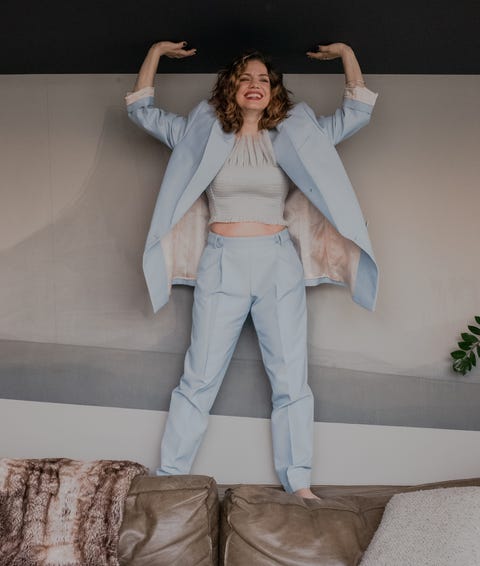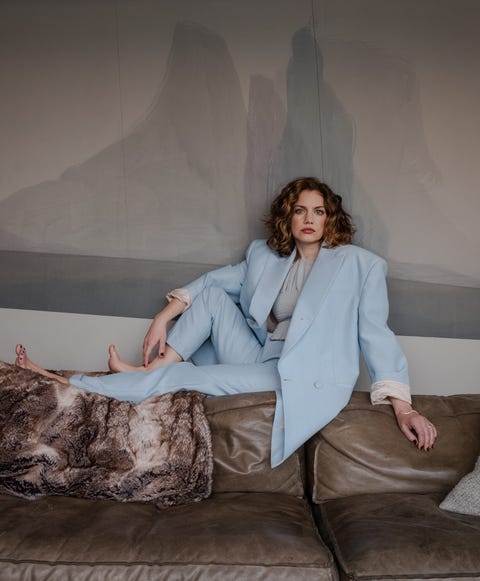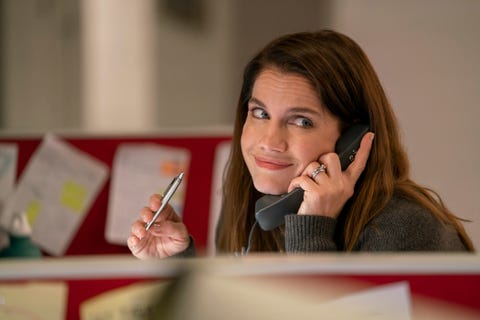Maybe it has something to do with her eyes. Anna Chlumsky has long been mystified by the media intent on remembering her only as the preteen protagonist of 1991’s My Girl, in which she starred opposite Macaulay Culkin as the precocious and death-obsessed Vada Sultenfuss. After 30 years and six Emmy nominations, hasn’t she earned the right to metamorphose? Can everyone, anyone, please, just let it go?
Yet it’s true that Chlumsky, at 41, shares an exceptional resemblance to her younger self, a resemblance many of her fellow child stars have excised over the years, either through intentional styling or the unrelenting creep of age. Even decades later, Chlumsky’s eyes are still the “great, big sparkling eyes” Jamie Lee Curtis’s character compliments in My Girl; her full lips and wide-set nose are exactly how you remember them; and her dropped-jaw expressions—Chlumsky describes herself as having a “rubber face”—are just as whimsical. Anders Holm, who plays her on-screen husband in the upcoming Netflix series Inventing Anna, puts it this way: “She seems like a person you know.”
But Chlumsky might push back against this idea, though out of habit rather than offense. (“I’m very happy,” Chlumsky says of her renewed career. “I have a beautiful life. And I trust not one soul, and I have a very complicated relationship with personal agency.”) She’s spent the past 30 years battling the idea that the public could know her and, more importantly, keep her. She exited the entertainment industry as an 18-year-old, exhausted by what she’d later describe as the “trauma” of child stardom. It wasn’t until years later that she quietly rejoined the theater community, eventually working her way back to film and television, which culminated in a widely acclaimed seven-season turn in the HBO political comedy Veep. Three years after Veep’s final season aired, she returns now with Inventing Anna, in which she plays a fictionalized version of the New York Magazine journalist Jessica Pressler, whose story about the “fake German heiress” Anna Delvey went viral in 2018. It’s a curious role, one that’s shifted many of Chlumsky’s preconceptions about who really has the power to control a narrative, especially in the public eye.
And yet. Here we still are. Talking about My Girl. Does she ever get sick of talking about My Girl?
“Yes. Unequivocally,” she says, plucking a loose fry from an overflowing plate of chicken tenders that’s been shuttled up to her room at the 1 Hotel Brooklyn Bridge. “You ever get sick of talking about that recital you did when you were 10?”
Chlumsky is perched, legs folded beneath her, on a chair opposite me. She’s wearing a youthful baby blue Rugrats-branded Puma sweatshirt—she voices Charlotte Pickles in the Paramount+ revival of the series—with a pair of gray leggings and fuzzy socks. I realize this is likely how Chlumsky would prefer to spend an average Saturday meal with her husband and two young daughters. Except—God help us—that we’re still talking about My Girl.
Chlumsky’s spent numerous hours discussing this dilemma in therapy. “Even though it’s been 30 years, people still want to be like, ‘Oh no, but I still own you,’” she says. “It’s really strange. I used to just think it was lazy. But now I have to think that there’s something more to it.”
As a young actress, she didn’t understand how the media attention would warp her psyche, in large part because she’d been acting since she was barely conscious. (She was 10 months old when she appeared in her first print ad; 2 years old in her first commercial.) But after My Girl became a surprise hit, her reality shot to a new stratosphere. Suddenly, she was being interviewed, alone, on Johnny Carson’s Tonight Show, and her first kiss—in My Girl with Culkin, already universally beloved after his turn in Home Alone—won an MTV Movie Award for Best Kiss. Interviewers asked her repeatedly about that kiss, her newfound fame, and how she’d handle the pressures of stardom, even as the interviewers themselves heaped on that pressure. “I think about how everyone dreams about being a star in the movies, and sometimes I, um, I enjoy it. And sometimes I just want to enjoy my privacy, too,” Chlumsky, 10, told Cinema Showcase.
An only child to divorced parents, Chlumsky was now both daughter and provider, and the pressure for her to retain roles after My Girl 2 came out in 1994 collapsed into frustration as she reached puberty. Hopping from dermatologist to dermatologist in pursuit of a magical skin treatment, she was directed to work out on her lunch breaks to offset any weight gain. After she played opposite Sissy Spacek in Trading Mom and Christina Ricci in Gold Diggers: The Secret of Bear Mountain, roles dried up. Chlumsky was older; no longer did she look the part of the tiny tomboy with the crooked grin. Nor did she feel like one either.
More than once, Chlumsky pauses our interview to clarify that she’s happy; she’s not special; this “trauma” is unique for every child actor. She knows this because she talks to them. When Matilda actress Mara Wilson penned a 2021 New York Times essay in response to the news of Britney Spears’s conservatorship battle, called “The Lies Hollywood Tells About Little Girls,” Chlumsky read the whole thing in one sitting. “I was shaking, shaking, reading that in public,” she says. “Cause [it felt like] there were [words] ripped, exactly, from my mouth. Like the words that she would tell people to get them to go away? Same words as mine. It was crazy.” Chlumsky reached out to Wilson, and the two now converse on occasion.
What Wilson referred to in her essay as “The Narrative”—“the idea that anyone who grew up in the public eye will meet some tragic end”—Chlumsky calls the “attrition rate” of child stardom. We all know about it, she says: Being forced to monetize yourself before your brain is fully developed? Of course it fucks you up. That’s why so many people seem stunned that she left Hollywood, that she grew up without experiencing a stint in rehab, a couple failed marriages, or some iteration of a tabloid meltdown. “You’re aware there’s an attrition rate,” she says, and it’s unclear if the “you” is meant to be ubiquitous. “And for some reason, that doesn’t—that hasn’t, until lately—really mattered…Everyone’s aware, but they benefit from it. They benefit from somebody’s life being destroyed.”
In Inventing Anna, Chlumsky plays Vivian Kent, a journalist who learns about Delvey’s scam and decides it’ll be her next big story—the one that transforms her languishing career into the sparkling success it should be. Although both Vivian’s motivations and her dialogue are often audacious, even ridiculous—“I give good story” stands out—her drive is nonetheless recognizable to anyone who’s researched an investigative feature. Throughout the limited series’ nine episodes, Vivian see-saws between different perspectives on her obligation to Delvey. What’s the truth? Whose truth matters most? And by making this young woman famous, is Vivian condemning her to a fate worse than jail time? Worst of all, she likes this snotty socialite, even admires her, perhaps to an unethical degree; what’s she supposed to do with that?
The irony of these questions are not lost on Chlumsky, nor are they lost on me, as we sit and plug away at the most intimate moments of her childhood. She’s scraped and clawed for her privacy, her autonomy; she’s married to a man with a “normal” career—Shaun So, a military veteran and entrepreneur—and spends many evenings and weekends at home in Brooklyn. Generally speaking, her life events don’t make headlines, and she can work without the looming specter of her erstwhile self.
So when I ask if she’s still in touch with anyone from the My Girl era, her face, normally so jubilant, turns sad, almost pitying.
“Yeah,” she says, “but I just don’t know why that matters.”
I attempt an explanation. I'm connecting the dots: Is this trauma something she's discussed with her former co-stars, by way of catharsis? Or has she intentionally kept that era of her life in the past?
She nods, rocks back in her chair. “I guess that makes sense to me. No, this is helpful that I’m actually asking you,” she says. “What I’ve been realizing on this press tour is, it weirdly is therapeutic that I played this type of a journalist, because I never would’ve known to ask you that. It is helping me break down the defenses a little. Be human to human, as opposed to just going, ‘Oh, you’re just out to get me.’ You know what I mean? Which is hard, because most of the way it shook out is that it was all just fodder.”
Even her “normal” life, as a child, became fodder, in part because it seemed so destined to shatter. The San Bernardino County Sun described her, in 1995, as the “contrast” to the “longstanding rule” of child stars falling from grace. “By both looks and personal style, she’s the pleasant, mannerly kid down the street; the one who gets good grades in school, adores her parents, considers the price before ordering from a menu,” the paper wrote.
There was a right way to be a child performer and a wrong way, and Chlumsky couldn’t be free of it until she slipped out of the limelight entirely. She’s told the tale of her daring escape on numerous occasions, but to recap, here’s the gist: She was 18, in college, and coming off another bad audition. Shoving the scripts into the passenger seat of her car, she turned and looked at them. Just stared. Through some metaphysical cocktail of desperation and epiphany, they spoke to her, and what they said was, “You never have to do this again.”
What came afterward was so passive, Chlumsky barely remembers thinking it through. She started ignoring calls from agents. She neglected to pay her union dues. Over time, she phased into the life of the average University of Chicago student, the one who, yes, was in My Girl, but now studied international relations and met her boyfriend on the quad. For a while, anonymity was bliss. But after graduation, she moved to New York and scooped up a fact-checking job at the travel survey company Zagat, which was predictably miserable. Then came a stint as an editorial assistant in the sci-fi and fantasy department at HarperCollins, where she’d hoped to become Kitchen writer Banana Yoshimoto, or someone like her, anyway. But Chlumsky’s friends at the kung fu school she’d enrolled in told her she seemed “sad.” She drifted around the city attending theater performances, crying on her lunch breaks, and running into Roberta Flack at nail salons. (When Chlumsky told the singer she was working in publishing, Flack “looked at me like I had seven heads,” she told Gimlet podcast Without Fail. “I felt a little like I’d disappointed her.”)
Chlumsky isn’t what I’d describe as woo-woo, though she’s literate in tarot and refers to the current era of Silicon Valley as “in its Saturn return.” But after a particularly depressing morning at HarperCollins, a 20-something Chlumsky wandered out into the traffic around 53rd and Fifth and paid attention when a fortune teller stalked her around the corner. “She’s like, ‘Are you the girl from My Girl?‘” Chlumsky says. “I’m like, God dammit. Today? And then she’s, ‘Wait. You’re not done. You want to keep doing it.’”
She followed the fortune teller back to her station. “It was $40 for a 10-minute palm reading,” she says. “And you’re not on a big salary at that point. I needed my money…It just goes to show you how desperate I am for answers, that I would pay $40 for 10 minutes on my lunch break.”
Returning to her office, Chlumsky AIMed her friends and then-boyfriend for their thoughts on her auditioning again. So, who was at that point in advanced individual training for the Army, told her it’d be hypocritical of him to chastise her for taking a risk. Slowly, she eased back into the world of performance, initially with acting classes at Manhattan’s Atlantic Acting School. “I went to the Atlantic just to see what the craft is all about,” she says. “And the first thing they say is, ‘This is a play. It’s not called a tedium. It’s called a play. So we’re here to have fun.’” A revelation. “I, literally—I had to go to school to find out how to be a kid.”
Chlumsky has this pulsating aura. When she laughs, she tosses her head back, almost aggressively, and no matter the sound that emerges—sometimes a bark, sometimes a shriek, occasionally a smirk through her teeth—it shoots her voice up two octaves and is delightful, every single time. Unlike some actresses her age, her face doesn’t have the pressed-laundry look; when she talks, it’s all twisting lips and furrowed brows and rapid blinking. You’d think that she’d become some reincarnation of Lucille Ball, or some sort of comedian akin to a Kristen Wiig or Tina Fey. But in the role that transformed her life—Amy Brookheimer, Julia Louis-Dreyfus’s chief of staff in the political satire Veep—Chlumsky was frequently the straight man to her co-stars’ hyperbolic antics. While Dreyfus could make a Grecian bust explode into hysterics, Chlumsky had the arguably more challenging job of coming off as the most competent woman in the room, even when Amy was anything but.
Chlumsky, eventually nominated for six Emmys in the role, pulled this off with gravitas. Her familiarity made Amy empathetic; her sharpness—the way she could spit the word “fucking” like it’d been ripped from her gut—made her entrancing. As Dreyfus explains it, “She has a look in her eye. And you definitely feel like—I mean, she has an intensity that’s unusual.”
“People started recognizing me on the street for Veep instead of for some bullshit I did when I was 10,” Chlumsky says. “It was the first time that I ever understood what it felt like to be happy to be asked about your job by a stranger.”
As the cast grew in comfort with one another, they became not only co-workers but allies. Dreyfus supported Chlumsky as she carried two pregnancies during the show’s run. When Dreyfus was diagnosed with cancer, Chlumsky was supportive “in a calm way,” Dreyfus says. “She became famous and she got multiple accolades [through Veep], all of which were so deserved, but she remained the intelligent, grounded person that she was.”
That intelligence soon caught the attention of Shonda Rhimes, who wrote and produced Inventing Anna. Although Vivian is not meant to be Jessica Pressler, Rhimes clarified, she needed to be “both dramatic and funny,” and Chlumsky could straddle that ground with alacrity. Most of all, Vivian needed to be fixated, to a neurotic degree, on the real story of Anna Delvey—who this conniving little con artist was beneath the Céline glasses and $800 highlights. She would discover, of course, that it all depends on whom you ask. As Holm explains, “[Vivian]’s not a journalist to just write things. She wants to uncover something. She wants ownership. She wants it to reflect her.”
Chlumsky, now with a wistful smile, can relate. “I was always really interested in playing a journalist because I just kind of admired the ability to ask whatever you want,” she says. “I was always interested in hotspot journalism and war time and stuff like that. And then when this [job] came in, I was like, ‘Oh.’ This is more akin to who I’ve met my whole life.”
So, who’s entitled to Chlumsky's story, or even her talent? Finally, she feels more and more certain that she gets to decide. After Inventing Anna, she’s got a slasher film coming out that’s “super queer.” She’s dying to do a period piece. Now that she’s hit mid-life, she’s reassessing her dream roles, setting aside Juliet for Lady Montague, or perhaps Charlotte in A Little Night Music. It’s when she allows her decisions to be articulated by an outsider that she gets—not nervous, exactly, but pensive. “What are you going to put in this article? That’s the scary thing,” she says. Her stylists have recently vacated the hotel room she’s staying in, but she’s still wearing the dazzling teal eyeshadow and neon lipstick they applied, and it makes her words feel stickier, like we’re in a melodrama.
In the final episode of Inventing Anna, there’s a moment when Julia Garner, who plays Delvey, tells Chlumsky’s Vivian not to regret publishing the article that might or might not have led to her elongated prison sentence. “This was a transaction,” she says. “We had a deal. You said you would make me famous, and you did.” But then she reaches above the glass partition at Rikers Island and takes Vivian’s hand. It’s one of the only moments in the series when Garner’s Anna shows something like genuine affection. For not the first time in the show’s nine episodes, the journalist-source barrier is shattered, and Vivian's eyes fill with tears. She thinks she knows Anna. But Chlumsky knows she doesn’t.
“We’re all figuring this out in real time, just by examining one another and examining ourselves,” Chlumsky says. “And so I think that that’s what we watch Vivian do. Every day you’re like, ‘Yeah, she’s this! And this is how I feel about it!‘ And then you're like, ‘Hmm. But then there’s that?” But really, what is it?”
Finally, as she pops another tender into her mouth and widens those big blue eyes, she asks what Vivian, after nine episodes, still can’t answer. “Does it matter?”
Styled by Jessica Paster; Hair by Patrick Kyle for Exclusive Artists using UNITE Hair; Makeup by Marie-Josée Leduc for Exclusive Artists using Odièle Beauty; Suit by Philosophy di Lorenzo Serafini.







No comments:
Post a Comment